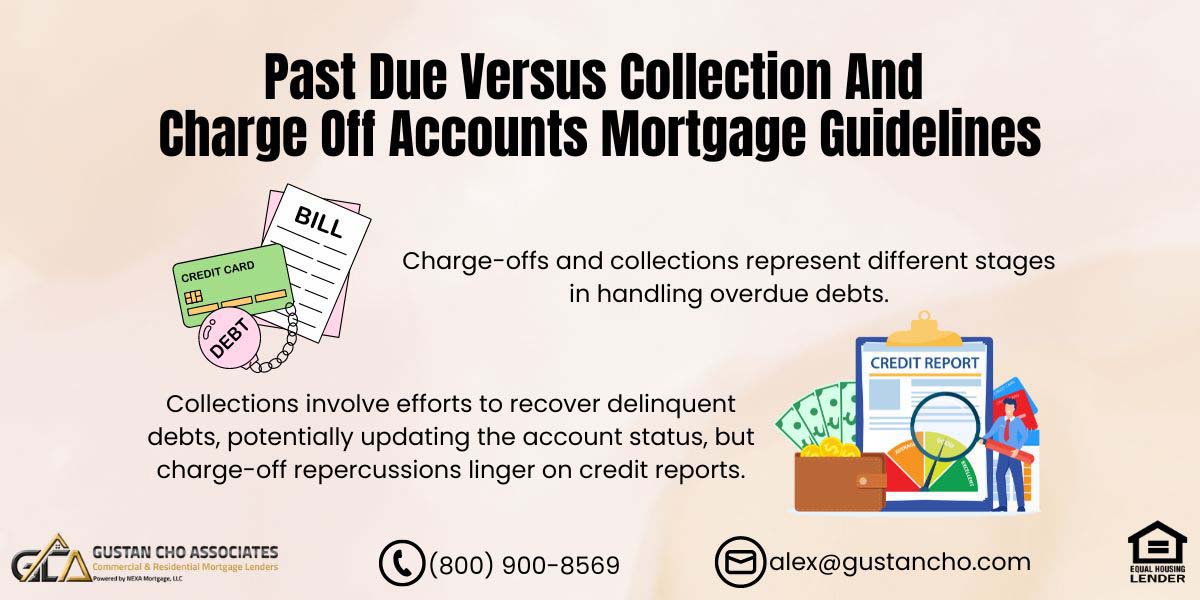In this blog, we will discuss and cover Past Due Versus Collection And Charge Off Accounts when qualifying and getting pre-approved for a mortgage loan. FHA loans are the most popular mortgage loan programs today for first-time home buyers.
What is the Difference Between Charge-Off and Collections?
Charge-off and collections are distinct stages in the process of handling overdue debts. If a creditor determines that a debt is unlikely to be repaid, it will be charged off. This means the debt will be removed from the books as an accounts receivable. The borrower remains responsible for the debt, negatively impacting their credit report and score.
Conversely, collections involve efforts to recover delinquent debts through internal means or third-party agencies. This may include phone calls, letters, or legal action. Successfully resolving a debt in collections can update the borrower’s account status, but the repercussions of a charge-off can linger on their credit report. Unresolved debts can lead to further consequences, such as wage garnishment.
Overall, charge-off signifies the creditor’s acknowledgment of an uncollectible debt, while collections represent ongoing attempts to recoup the outstanding amount. Both stages have significant implications for the borrower’s financial standing and creditworthiness.
FHA Guidelines on Past Due Versus Collection And Charge Off Accounts
FHA loans are also the best loan program for homebuyers with the following credit and income profile:
- have less than perfect credit
- lower credit scores
- prior bankruptcy
- prior foreclosure
- judgments
- tax liens
- unpaid collection accounts
- charge off accounts
- late payments
- past due debts
FHA Loans are not just for consumers with bad credit. They are beneficial to consumers who have great credit but have higher debt to income ratios. HUD, the parent of FHA, allows non-occupant co-borrowers to qualify for a home loan. Conventional loans have a maximum debt to income ratio cap set at 50%. HUD caps the debt to income ratios at 56.9% back end and 46.9% front end to get an approve/eligible per automated underwriting system findings. All loan programs, including FHA, have mortgage guidelines on past due versus collection and charge off accounts.
Past Due vs. Collection vs. Charge-Off: What Lenders See
Each status affects your mortgage approval differently. We’ll help you understand what matters most.
Can an Account be Charged-Off and Past Due ?
Yes, an account can be past due and charged off, although these terms represent different stages in the debt collection process. When an account is past due, the borrower has failed to make the required payments on time, leading to a delinquent status. This can happen after missing one or more scheduled payments. If the borrower continues to miss payments, the account may remain past due, accumulating more late fees and penalties over time.
However, if the delinquency persists without resolution, the creditor may eventually decide to charge off the account. Charging off an account occurs when the creditor writes the outstanding debt uncollectible for accounting purposes. Typically, this happens after a certain period of non-payment, often around 180 days past due.
Despite the charge-off status, the borrower is still legally obligated to repay the debt, though the creditor may pursue collections to recover the outstanding amount. Therefore, an account can be past due, indicating ongoing delinquency, and charged off, signifying the creditor’s acknowledgment that the debt is unlikely to be fully collected.
Can a Collection Account Show a Past Due Balance?
A collection account can show a past-due balance, but the specifics depend on how the collection process unfolds. When a debt is handed over to a collections agency by the original creditor or an internal collections department, the account is considered to be in collections.
At this point, the collections agency takes charge of attempting to recover the debt from the borrower. Suppose the borrower fails to make payments or doesn’t fully settle the debt. In that case, the collection account may continue to amass additional charges, such as interest, fees, or penalties, as per the terms of the original agreement or any subsequent agreements reached with the collections agency.
These additional charges contribute to the account’s past-due status despite already being in collections.
Addressing collection accounts promptly is crucial for borrowers. Working with the collections agency to resolve the outstanding debt can mitigate further damage to their credit score and financial situation. Persistent non-payment can lead to escalated consequences, including legal action or additional negative impacts on creditworthiness, making it imperative for borrowers to engage with collections efforts to find a resolution.
Past Due Versus Collection And Charge Off Accounts Basic Guidelines
The Federal Housing Administration has very lenient lending guidelines with regards to past due versus collection and charge off accounts than any other loan programs. However, mortgage guidelines on past due versus collection and charge off accounts are different for single-family homes, two to four-unit properties, and investment properties.
Minimum Credit Score Requirements to Qualify and Getting Pre-Approved On FHA Loans
For all FHA loans, the minimum credit score required to qualify for a 3.5% down payment FHA loan is 580. With regards to past due versus collection and charge off accounts with borrowers buying a single-family home or anyone unit property such as a condominium or townhome is that all past due accounts need to be brought current. Past due accounts are different than collection accounts.
Mortgage Guidelines On Past Due Versus Collection And Charge Off Accounts
With regard to collection accounts, borrowers are not required to pay any outstanding collection accounts or non-mortgage related charge off accounts. This holds true regardless of how much the amount outstanding collection balance and/or charge off account is. Collection accounts are classified as non-medical collections and medical collection accounts. Medical collection accounts are exempt from credit disputes.
Medical Collections versus Non-Medical Collection Accounts
Medical collections are exempt from debt to income calculations on outstanding collection balances. However, if the borrower has a total outstanding collection balance of greater than $2,000 from the combination of all non-medical collection accounts, then 5% of the outstanding collection balance will be used to calculate the borrower’s debt to income ratios.
This holds true even though the borrower does not have to pay anything and this payment is a hypothetical debt.
Can You Get a Mortgage With Past-Due or Charged-Off Accounts?
Yes—depending on the account type and lender guidelines. We’ll show you how to qualify.
How Large Outstanding Collections Impact Debt To Income Ratios
Consumers with substantial large balances can enter a written payment agreement with the collection agency and/or creditor for a monthly payment agreement. That monthly payment agreement will be used to calculate the debt to income ratios in lieu of the 5% of the outstanding collection account balance.
For example, here is a case study:
- if the consumer has an outstanding collection balance of $10,000
- 5% of the $10,000 outstanding collection balance, or $500, will disqualify borrower due to high debt to income ratios
- then the borrower can enter into a written payment agreement with the collection agency or creditor for a lesser amount
- that lesser amount will be used as the monthly payment in calculating the borrower’s debt to income ratios and not the $500
Credit Disputes Will Halt Mortgage Process
Credit disputes can be deal killers and have an extremely negative impact on any type of loan program. Cannot have credit disputes on any non-medical collection accounts with outstanding balances of greater than $1,000 (a combination of all non-medical collection accounts on credit report ). Charge off accounts do not matter no matter what the outstanding charge off amount is. However, cannot have any credit disputes on charge-off accounts.
Credit Disputes on Non-Medical versus Medical Collection Accounts
Before consumers can proceed with the mortgage process, all non-medical collection accounts and charge-off credit disputes need to be removed. The credit report needs to reflect that. Unfortunately, when consumers retract credit disputes off a credit report, that will lower credit scores. Most often credit scores can drop significantly.
There are instances where borrowers can no longer meet the minimum credit score requirements. Can have credit disputes with non-medical collection accounts that have zero balances on them. Medical collection accounts do not count. Can have credit disputes with medical collection accounts.
Non-medical disputes with zero balance are exempt from retraction. Any credit disputes where the date of last activity is older than 24 months (DLA) are exempt from retraction.
Not All Negative Accounts Are Treated the Same by Underwriters
Apply Now And Get recommendations From Loan Experts
What is the Difference Between a Charge-Off and a Delinquent Account?
An account that hasn’t been paid on time as specified in the loan or credit agreement is delinquent. The borrower is considered to have failed to make payments on time for this account. A delinquent account is overdue, meaning it has missed one or more payments.
Delinquency can occur for various reasons, such as financial hardship or forgetfulness, but it typically results in late fees, penalties, and a negative impact on the borrower’s credit score.
On the other hand, a charge-off occurs when a creditor decides that a delinquent debt is unlikely to be collected and writes it off as a loss for accounting purposes. This typically happens after the account has been delinquent for an extended period, often around 180 days.
While a delinquent account reflects ongoing missed payments, a charge-off signifies the creditor’s acknowledgment that the debt is unlikely to be fully recovered. Even though the debt has been charged off, the borrower still has a legal obligation to repay it, which means the creditor can continue to attempt to collect the outstanding amount. However, a charge-off has more severe implications for the borrower’s credit report and score than a delinquent account.
Conforming Mortgage Guidelines On Collection Accounts On 2 To 4 Unit Properties And Second Homes
Fannie Mae Guidelines on collection accounts on 2 to 4 Unit Properties and Second Home Purchases are different than those of single-family homes or one-unit homes such as condominiums and townhomes. For two to four-unit owner-occupant properties and for second home properties here are the mortgage guidelines.
Fannie Mae Guidelines on collections and charge off accounts that total more than $5,000 need to be paid off prior to closing or at closing.
Past Due Versus Collection And Charge Off Accounts On Investment Properties
Fannie Mae mortgage guidelines with regards to collection accounts and charge off accounts on investment properties are much stricter than single-family homes and two to four-unit properties. Any collection accounts and/or non-mortgage charge off accounts that are equal and/or greater than $250.00 needs to be paid off prior to or at closing on two to four-unit homes and investment properties.
If you have any questions on Past Due Versus Collection And Charge Off Accounts Mortgage Guidelines or you need to qualify for loans with a lender with no overlays on government or conforming loans, please contact us at Gustan Cho Associates at 800-900-8569. Text us for a faster response. Or email us at alex@gustancho.com . The team at Gustan Cho Associates is available 7 days a week, on evenings, weekends, and holidays.
FAQs: Past Due Versus Collection And Charge Off Accounts in Mortgage Loans
- 1. What is the Difference Between Charge-Off and Collections? Charge-offs and collections represent different stages in handling overdue debts. When a debt is unlikely to be repaid, it’s charged off, indicating it’s removed from accounts receivable. The borrower remains responsible, impacting their credit. Collections involve efforts to recover delinquent debts, potentially updating the account status, but charge-off repercussions linger on credit reports. Both stages affect the borrower’s financial standing significantly.
- 2. Can an Account be Charged-Off and Past Due? Yes, an account can be both past due and charged off. Being past due reflects ongoing missed payments, while charge-off occurs when the creditor writes off the debt as uncollectible, typically after an extended period of non-payment. The borrower is legally obligated to repay despite charge-off, and collections may still be pursued to recover the debt.
- 3. Can a Collection Account Show a Past Due Balance? Yes, a collection account can display a past-due balance. Additional fees may accrue once a debt is in collections, contributing to a past-due status. Addressing collection accounts promptly is crucial to mitigate credit score damage and further financial repercussions.
- 4. What is the Difference Between a Charge-Off and a Delinquent Account? A delinquent account signifies missed payments, while a charge-off acknowledges the debt as uncollectible—delinquency results in late fees and impacts credit scores. In contrast, charge-off involves removing the debt from accounts receivable, with severe credit report implications, though the borrower remains liable.
- 5. Conforming Mortgage Guidelines on Collection Accounts and Investment Properties. Fannie Mae guidelines differ based on property type. For single-family homes, collection accounts over $5,000 should be paid off. For two to four-unit properties or second homes, accounts exceeding $5,000 must be settled. Investment properties require payment for any account above $250. These guidelines aim to manage risk in mortgage lending.
This blog about Past Due Versus Collection And Charge Off Accounts Mortgage Guidelines was updated on March 29th, 2024.
Struggling With Old Debts? You May Still Qualify for a Mortgage
We help borrowers with charge-offs and collections get approved—even after being denied elsewhere.










